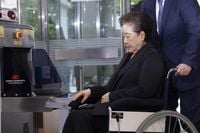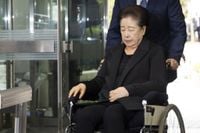On October 10, 2025, the legal and political landscape of South Korea was rocked by the indictment of Hak Ja Han, the 82-year-old leader of the Unification Church, on a string of serious charges including bribery, illegal political donations, embezzlement, and destruction of evidence. The case, which also ensnares several top aides and high-profile political figures, has reignited longstanding debates about the relationship between religious organizations and political power in the country.
According to reports from AP and UPI, Han—widow of the church’s charismatic founder Sun Myung Moon—stands accused of orchestrating an elaborate scheme to funnel church funds and luxury goods to powerful politicians and their families. Prosecutors allege that in 2022, Han instructed her aides to deliver luxury handbags, diamond jewelry, and other designer items to Kim Keon Hee, the wife of then-President Yoon Suk Yeol, on two or three separate occasions. The gifts, valued at roughly 82 million won (about $75,000), were allegedly intended to secure business favors for the church and curry influence at the highest levels of government.
But the alleged misconduct didn’t stop there. Investigators further claim that Han directed church officials to deliver a bribe of 100 million won (approximately $70,000) to Kweon Seong-dong, a conservative lawmaker and staunch ally of Yoon, just months before Yoon’s successful presidential campaign in March 2022. In a separate scheme, prosecutors say Han and her senior aides, Yoon Young-ho and Jung Wonju, funneled about 144 million won (around $104,000) in cash to a sitting lawmaker by dividing the money into smaller sums to skirt South Korea’s strict Political Funds Act.
The investigation, led by special prosecutor Min Joong-ki, is part of a wider probe into the administration of Yoon Suk Yeol, whose short-lived presidency ended in scandal. Yoon was removed from office in April 2025 after a controversial martial law order in December 2024 triggered his impeachment. He was re-arrested in July 2025 and now faces rebellion and other serious charges. Kim Keon Hee, the former first lady, was herself arrested and indicted in August 2025 over bribery and other alleged crimes. The church’s alleged support for Yoon’s presidential campaign—mobilizing followers and leveraging its vast organizational network in exchange for policy favors—has become a focal point for investigators.
During questioning, Han has steadfastly denied all allegations. She reportedly told prosecutors, “Jung Wonju planned and executed everything,” suggesting that her longtime executive assistant bore responsibility for the financial dealings at the heart of the probe. The Family Federation for World Peace and Unification, the church’s official name, issued a statement expressing “deep regret” over the indictment, but insisted that “the funds were used for religious and public purposes.” The church also condemned Han’s arrest last month as a disrespectful act against an “internationally respected religious leader,” and requested that the court consider her advanced age and fragile health during trial proceedings.
Han’s chief of staff, Jung Wonju, was charged without detention, while Yoon Young-ho, another top official, was detained and indicted in August for related offenses. Both are accused of facilitating the unlawful donations and manipulating internal ledgers to conceal the transactions. Prosecutors have also alleged that Han and her aides directed the destruction of internal financial records after learning of an investigation into alleged gambling activities at a U.S. casino in October 2022. These actions, they argue, were aimed at covering up the illicit flow of church assets and preventing investigators from uncovering the full scope of the church’s political activities.
The Unification Church, founded in 1954 by Sun Myung Moon, has long been a lightning rod for controversy. Known for its mass weddings and conservative family values, the church claims to have around three million followers worldwide—including 300,000 in South Korea and 600,000 in Japan—and oversees a sprawling business empire spanning construction, tourism, education, and media. Since Moon’s death in 2012, Han Hak-ja has led the church, earning reverential titles such as “holy mother” and “god’s only begotten daughter” from members. Under her stewardship, the movement has expanded its global reach but has also faced mounting scrutiny over its financial transparency, internal divisions, and perceived political ambitions.
South Korean media and lawmakers have for years questioned the church’s vast donations and its quiet influence on public officials. Critics argue that the organization has used its immense financial resources to wield political power behind the scenes, while defenders insist that their actions are genuine expressions of faith and civic engagement. The current prosecution, however, has been careful to emphasize that the charges are strictly about alleged criminal acts—not religious beliefs. As the Seoul Central District Court prepares to open hearings later this month, legal analysts suggest that the outcome could set a precedent for how South Korea regulates the political activities of powerful religious groups.
Indeed, the case has already sparked renewed debate over the boundaries between faith and politics. Some observers worry that the scandal could further erode public trust in both religious institutions and political leaders. Others see the investigation as a necessary step toward greater transparency and accountability in a society where the entanglement of money, power, and belief has often gone unchecked. “The prosecution has emphasized that the charges target criminal acts, not beliefs, and that religious freedom cannot shield misconduct from the law,” UPI reported, encapsulating the delicate balance at stake.
Meanwhile, the church’s internal dynamics have come under fresh scrutiny. Han’s testimony pointing to Jung Wonju as the mastermind behind the financial dealings has raised questions about possible rifts within the upper echelons of the organization. The ongoing probe may yet uncover additional violations, including breaches of the Political Parties Act or tax laws, as prosecutors continue to examine whether other individuals or entities participated in or benefited from the illicit operations.
If convicted, Han and her aides could face significant prison terms and the forfeiture of church assets linked to the offenses. The church’s leadership, for its part, remains defiant, insisting on the legitimacy of its expenditures and vowing to contest the charges in court. The outcome of the trial will be closely watched not only by the church’s millions of followers but also by a broader public eager for answers in a nation still grappling with the legacy of political and religious entanglements.
The coming weeks promise more revelations as the legal process unfolds. For now, the indictment of Hak Ja Han stands as a stark reminder of the complexities—and the consequences—of mixing spiritual authority with political ambition in modern South Korea.


